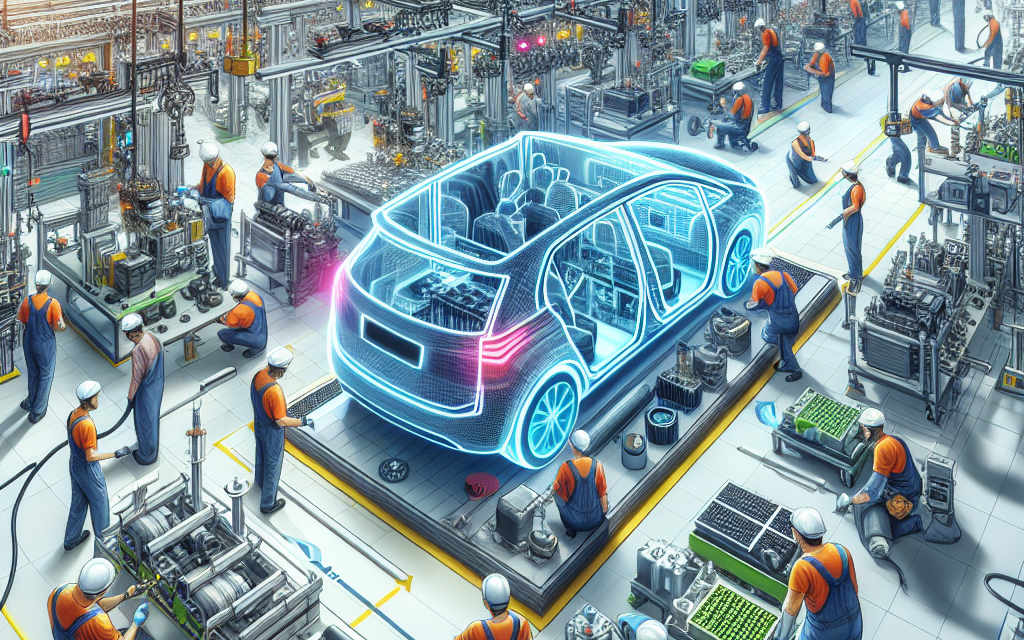“Foxconn: Pioneering Innovation and Expanding Horizons in the Competitive EV Market.”
Introduction
Foxconn, a leading global electronics manufacturer, is strategically positioning itself to capitalize on the burgeoning electric vehicle (EV) market. As the automotive industry undergoes a significant transformation towards electrification, Foxconn aims to leverage its extensive manufacturing expertise and technological capabilities to expand its footprint in this competitive landscape. By forging partnerships with established automakers and investing in innovative EV technologies, Foxconn seeks to enhance its product offerings and drive sustainable growth. This initiative not only reflects the company’s commitment to diversifying its business portfolio but also underscores the increasing importance of electric mobility in the global economy.
Foxconn’s Strategic Partnerships in the EV Sector
Foxconn, a global leader in electronics manufacturing, is strategically positioning itself to capitalize on the burgeoning electric vehicle (EV) market through a series of well-calibrated partnerships. As the automotive industry undergoes a significant transformation driven by technological advancements and environmental considerations, Foxconn recognizes the imperative to align itself with key players in the EV sector. This alignment not only enhances its manufacturing capabilities but also allows the company to leverage its extensive experience in electronics to meet the unique demands of the automotive landscape.
One of the most notable partnerships that Foxconn has forged is with Fisker Inc., an American electric vehicle manufacturer. This collaboration is particularly significant as it combines Fisker’s innovative design and engineering prowess with Foxconn’s robust manufacturing capabilities. By working together, the two companies aim to streamline production processes and reduce costs, ultimately accelerating the time-to-market for new EV models. This partnership exemplifies Foxconn’s strategy of integrating its supply chain expertise with the creative vision of automotive startups, thereby fostering an environment conducive to innovation.
In addition to its collaboration with Fisker, Foxconn has also entered into a joint venture with the Chinese automaker Geely. This partnership is particularly strategic given Geely’s established presence in the Chinese market, which is the largest EV market in the world. By leveraging Geely’s market insights and distribution networks, Foxconn can enhance its reach and operational efficiency in a region that is rapidly adopting electric vehicles. This collaboration not only positions Foxconn as a key player in the Chinese EV landscape but also allows it to tap into the growing demand for sustainable transportation solutions.
Moreover, Foxconn’s strategic partnerships extend beyond traditional automotive manufacturers. The company has also engaged with technology firms that specialize in software and battery technology, recognizing that the future of electric vehicles is not solely dependent on hardware but also on advanced software solutions and energy management systems. By collaborating with these tech companies, Foxconn aims to develop integrated solutions that enhance vehicle performance, safety, and user experience. This holistic approach underscores Foxconn’s commitment to innovation and its understanding of the multifaceted nature of the EV ecosystem.
As Foxconn continues to expand its footprint in the EV market, it is also focusing on sustainability and environmental responsibility. The company is actively seeking partnerships with organizations that prioritize green technologies and sustainable practices. By aligning itself with like-minded partners, Foxconn not only enhances its brand reputation but also contributes to the broader goal of reducing carbon emissions and promoting sustainable mobility. This commitment to sustainability is increasingly becoming a critical factor for consumers and investors alike, making it a strategic imperative for Foxconn as it navigates the competitive landscape of the EV market.
In conclusion, Foxconn’s strategic partnerships in the electric vehicle sector reflect a comprehensive approach to capturing opportunities in a rapidly evolving industry. By collaborating with established automakers, innovative startups, and technology firms, Foxconn is not only enhancing its manufacturing capabilities but also positioning itself as a leader in the transition to electric mobility. As the demand for electric vehicles continues to grow, Foxconn’s ability to forge meaningful partnerships will be instrumental in its quest to remain competitive and relevant in this dynamic market. Through these alliances, Foxconn is poised to play a pivotal role in shaping the future of transportation, driving innovation, and contributing to a more sustainable world.
Innovations in EV Manufacturing by Foxconn
Foxconn, a global leader in electronics manufacturing, is strategically positioning itself to capitalize on the burgeoning electric vehicle (EV) market. As the automotive industry undergoes a significant transformation driven by sustainability and technological advancements, Foxconn is leveraging its extensive manufacturing expertise to innovate within this competitive landscape. The company recognizes that the shift towards electric mobility is not merely a trend but a fundamental change in consumer preferences and regulatory frameworks, prompting a proactive approach to EV manufacturing.
One of the key innovations introduced by Foxconn is its modular manufacturing system, which allows for greater flexibility and efficiency in the production of electric vehicles. This system enables the company to adapt quickly to changing market demands and consumer preferences, thereby reducing lead times and production costs. By employing advanced robotics and automation technologies, Foxconn can streamline its manufacturing processes, ensuring high-quality output while maintaining scalability. This adaptability is crucial in an industry characterized by rapid technological advancements and evolving consumer expectations.
Moreover, Foxconn is investing heavily in research and development to enhance battery technology, a critical component of electric vehicles. The company is exploring partnerships with leading battery manufacturers to develop next-generation battery solutions that offer improved energy density, faster charging times, and longer lifespans. By focusing on these innovations, Foxconn aims to address one of the primary concerns of potential EV buyers: range anxiety. The development of more efficient battery systems not only enhances the performance of electric vehicles but also contributes to the overall sustainability of the automotive ecosystem.
In addition to battery technology, Foxconn is also exploring advancements in software and connectivity features for electric vehicles. As vehicles become increasingly integrated with digital technologies, the demand for sophisticated software solutions is on the rise. Foxconn is investing in the development of smart vehicle platforms that incorporate artificial intelligence and machine learning, enabling enhanced user experiences and improved vehicle performance. These innovations not only cater to the tech-savvy consumer but also align with the broader trend of connectivity in modern transportation.
Furthermore, Foxconn’s commitment to sustainability extends beyond the vehicles themselves. The company is implementing eco-friendly manufacturing practices, such as utilizing renewable energy sources and minimizing waste throughout its production processes. By adopting a circular economy approach, Foxconn aims to reduce its environmental footprint while simultaneously meeting the growing demand for sustainable products. This commitment to sustainability resonates with consumers who are increasingly prioritizing environmentally responsible choices in their purchasing decisions.
As Foxconn continues to expand its footprint in the EV market, it is also forging strategic partnerships with established automotive manufacturers and emerging startups. These collaborations are designed to leverage complementary strengths, facilitating knowledge exchange and accelerating innovation. By working alongside industry leaders, Foxconn can enhance its capabilities and broaden its market reach, positioning itself as a formidable player in the electric vehicle sector.
In conclusion, Foxconn’s innovative approach to EV manufacturing reflects its recognition of the transformative potential of electric mobility. Through advancements in modular manufacturing, battery technology, software integration, and sustainable practices, the company is not only enhancing its production capabilities but also contributing to the evolution of the automotive industry. As the demand for electric vehicles continues to grow, Foxconn’s strategic initiatives are likely to play a pivotal role in shaping the future of transportation, ensuring that it remains at the forefront of this dynamic and competitive market.
The Role of Foxconn in Sustainable EV Production
As the electric vehicle (EV) market continues to gain momentum, driven by increasing consumer demand and a global push for sustainability, Foxconn, a leading technology manufacturer, is strategically positioning itself to play a pivotal role in this evolving landscape. Known primarily for its assembly of consumer electronics, Foxconn is now leveraging its extensive manufacturing expertise to expand into the EV sector, focusing on sustainable production practices that align with the industry’s environmental goals. This transition is not merely a diversification of its business portfolio; it represents a commitment to innovation and sustainability in a market that is rapidly transforming.
Foxconn’s entry into the EV market is underscored by its ambitious plans to develop a comprehensive ecosystem for electric vehicles. By integrating advanced manufacturing technologies, such as automation and artificial intelligence, Foxconn aims to enhance production efficiency while minimizing waste and energy consumption. This approach not only reduces the carbon footprint associated with vehicle manufacturing but also positions the company as a leader in sustainable practices within the automotive industry. Furthermore, Foxconn’s investment in research and development is crucial, as it seeks to create cutting-edge solutions that address the challenges of EV production, including battery technology and supply chain sustainability.
In addition to its technological advancements, Foxconn is actively pursuing partnerships with established automotive manufacturers and startups alike. These collaborations are essential for fostering innovation and accelerating the development of electric vehicles. By pooling resources and expertise, Foxconn and its partners can tackle the complexities of EV production more effectively. This collaborative approach not only enhances the quality and performance of the vehicles produced but also ensures that sustainability remains at the forefront of their initiatives. As a result, Foxconn is not just a manufacturer; it is becoming a vital player in the broader ecosystem of electric mobility.
Moreover, Foxconn’s commitment to sustainable EV production extends beyond its manufacturing processes. The company is also focused on the lifecycle of electric vehicles, emphasizing the importance of recycling and reusing materials. By developing strategies for end-of-life vehicle management, Foxconn aims to minimize waste and promote a circular economy within the automotive sector. This holistic view of sustainability is increasingly important as consumers and regulators alike demand greater accountability from manufacturers regarding their environmental impact.
As the competitive landscape of the EV market intensifies, Foxconn’s proactive stance on sustainability will likely serve as a differentiator. The company recognizes that consumers are becoming more discerning, seeking not only high-quality vehicles but also those that align with their values regarding environmental stewardship. By prioritizing sustainable practices, Foxconn is positioning itself to meet this demand, thereby enhancing its brand reputation and market share.
In conclusion, Foxconn’s foray into the electric vehicle market represents a significant shift in its business strategy, driven by a commitment to sustainable production practices. Through technological innovation, strategic partnerships, and a focus on the entire lifecycle of electric vehicles, Foxconn is not only expanding its opportunities in a competitive market but also contributing to the broader goal of environmental sustainability. As the EV industry continues to evolve, Foxconn’s role will be crucial in shaping a future where electric vehicles are produced responsibly, ensuring that the benefits of this transformative technology are realized without compromising the planet’s health.
Foxconn’s Investment Plans for Electric Vehicle Technology
Foxconn, a global leader in electronics manufacturing, is strategically positioning itself to capitalize on the burgeoning electric vehicle (EV) market. As the automotive industry undergoes a significant transformation driven by technological advancements and environmental considerations, Foxconn recognizes the imperative to diversify its portfolio beyond traditional consumer electronics. The company’s investment plans for electric vehicle technology reflect a calculated response to the increasing demand for sustainable transportation solutions and the growing competition within the sector.
To begin with, Foxconn has made substantial commitments to research and development in EV technology. By allocating significant resources to innovation, the company aims to enhance its capabilities in battery production, electric drivetrains, and vehicle design. This focus on R&D is crucial, as the EV market is characterized by rapid technological evolution, necessitating continuous improvement and adaptation. Furthermore, Foxconn’s expertise in manufacturing and supply chain management positions it favorably to streamline production processes, thereby reducing costs and improving efficiency in the development of electric vehicles.
In addition to internal investments, Foxconn is actively pursuing strategic partnerships and collaborations with established automotive manufacturers and technology firms. By leveraging the strengths of these partnerships, Foxconn can accelerate its entry into the EV market while mitigating risks associated with new product development. Collaborations with companies that possess extensive experience in automotive engineering and design can provide Foxconn with valuable insights and resources, enabling it to create competitive electric vehicles that meet consumer expectations. This collaborative approach not only enhances Foxconn’s technological capabilities but also fosters innovation through the exchange of ideas and expertise.
Moreover, Foxconn’s investment plans extend beyond vehicle manufacturing to encompass the entire EV ecosystem, including charging infrastructure and software development. Recognizing that the success of electric vehicles hinges on a robust charging network, Foxconn is exploring opportunities to invest in charging solutions that can support the widespread adoption of EVs. By integrating hardware and software solutions, the company aims to create a seamless user experience for consumers, thereby addressing one of the primary concerns associated with electric vehicle ownership: range anxiety.
As Foxconn navigates the competitive landscape of the EV market, it is also mindful of the regulatory environment and sustainability considerations. Governments worldwide are implementing stricter emissions regulations and offering incentives to promote electric vehicle adoption. In response, Foxconn is committed to aligning its investment strategies with these regulatory frameworks, ensuring compliance while also contributing to global sustainability goals. By prioritizing environmentally friendly practices in its manufacturing processes and product offerings, Foxconn not only enhances its brand reputation but also positions itself as a responsible player in the automotive industry.
In conclusion, Foxconn’s investment plans for electric vehicle technology signify a proactive approach to seizing opportunities in a rapidly evolving market. Through a combination of robust R&D efforts, strategic partnerships, and a commitment to sustainability, the company is well-equipped to navigate the complexities of the EV landscape. As the demand for electric vehicles continues to rise, Foxconn’s initiatives will likely play a pivotal role in shaping the future of transportation, ultimately contributing to a more sustainable and technologically advanced automotive industry. By embracing innovation and collaboration, Foxconn is poised to emerge as a formidable contender in the competitive electric vehicle market, driving forward the transition to cleaner mobility solutions.
Challenges Faced by Foxconn in the EV Market
As Foxconn ventures deeper into the electric vehicle (EV) market, it encounters a myriad of challenges that could significantly impact its ambitions. One of the foremost hurdles is the intense competition within the industry. Established automotive manufacturers, such as Tesla, Ford, and General Motors, have already carved out substantial market shares and possess extensive experience in vehicle production and supply chain management. This competitive landscape necessitates that Foxconn not only innovate but also differentiate its offerings to capture consumer interest and loyalty.
Moreover, the rapid pace of technological advancement in the EV sector presents another significant challenge. The industry is characterized by continuous developments in battery technology, autonomous driving capabilities, and software integration. As a result, Foxconn must invest heavily in research and development to keep pace with these innovations. This investment is not merely a financial burden; it also requires a skilled workforce adept in cutting-edge technologies. The recruitment and retention of such talent can be difficult, particularly in a market where demand for skilled professionals often outstrips supply.
In addition to competition and technological demands, regulatory challenges pose a considerable obstacle for Foxconn. Governments worldwide are increasingly implementing stringent environmental regulations aimed at reducing carbon emissions and promoting sustainable practices. While these regulations create opportunities for EV manufacturers, they also impose compliance costs and operational constraints. Foxconn must navigate this complex regulatory landscape, ensuring that its manufacturing processes and products meet the necessary standards while remaining economically viable.
Supply chain disruptions further complicate Foxconn’s entry into the EV market. The COVID-19 pandemic highlighted vulnerabilities in global supply chains, leading to shortages of critical components such as semiconductors and batteries. As Foxconn seeks to scale its EV production, it must establish robust supply chain strategies to mitigate risks associated with these disruptions. This includes diversifying suppliers, investing in local production capabilities, and fostering strong relationships with key partners to ensure a steady flow of essential materials.
Additionally, consumer preferences in the EV market are evolving rapidly. As more options become available, consumers are becoming increasingly discerning, seeking vehicles that not only meet their functional needs but also align with their values regarding sustainability and technology. Foxconn must therefore conduct thorough market research to understand these shifting preferences and tailor its products accordingly. This requires agility in product development and marketing strategies, which can be challenging for a company traditionally focused on electronics manufacturing.
Furthermore, the financial implications of entering the EV market cannot be overlooked. The initial capital investment required for manufacturing facilities, technology development, and marketing can be substantial. Foxconn must ensure that it has a solid financial strategy in place to support its ambitions without jeopardizing its existing operations. This balancing act is crucial, as missteps could lead to significant financial strain.
In conclusion, while Foxconn is poised to expand its footprint in the competitive EV market, it faces a series of formidable challenges. From navigating intense competition and technological advancements to addressing regulatory requirements and supply chain vulnerabilities, the path forward is fraught with obstacles. However, with strategic planning, investment in innovation, and a keen understanding of consumer needs, Foxconn has the potential to carve out a significant presence in this rapidly evolving industry.
The Impact of Foxconn’s Expansion on Global EV Supply Chains
Foxconn, a global leader in electronics manufacturing, is strategically positioning itself to capitalize on the burgeoning electric vehicle (EV) market. As the demand for EVs continues to surge, driven by environmental concerns and technological advancements, Foxconn’s expansion into this sector is poised to have significant implications for global supply chains. By leveraging its extensive manufacturing expertise and established relationships with key players in the automotive industry, Foxconn aims to enhance the efficiency and resilience of EV supply chains worldwide.
One of the most notable impacts of Foxconn’s expansion is the potential for increased production capacity. The company has announced plans to build new facilities dedicated to EV components, which will not only streamline the manufacturing process but also reduce lead times for automakers. This is particularly crucial in an industry where rapid innovation and consumer demand can shift dramatically. By establishing a robust production network, Foxconn can help mitigate the risks associated with supply chain disruptions, which have become increasingly prevalent in recent years due to geopolitical tensions and the COVID-19 pandemic.
Moreover, Foxconn’s entry into the EV market is likely to foster greater collaboration among various stakeholders in the supply chain. The company has a history of forming strategic partnerships with technology firms and automotive manufacturers, which can lead to the sharing of resources and expertise. This collaborative approach can drive innovation, enabling the development of advanced technologies such as battery management systems and autonomous driving features. As Foxconn integrates its capabilities with those of its partners, the overall efficiency of the supply chain is expected to improve, resulting in faster time-to-market for new EV models.
In addition to enhancing production capabilities and fostering collaboration, Foxconn’s expansion is set to influence the sourcing of raw materials essential for EV manufacturing. The company is actively exploring opportunities to secure a stable supply of critical components, such as lithium, cobalt, and nickel, which are vital for battery production. By investing in upstream supply chains, Foxconn can help alleviate some of the volatility associated with raw material prices, thereby stabilizing costs for automakers. This proactive approach not only benefits Foxconn but also contributes to the overall sustainability of the EV market, as it encourages responsible sourcing practices.
Furthermore, Foxconn’s expansion into the EV sector aligns with global efforts to transition towards greener technologies. As governments around the world implement stricter emissions regulations and promote the adoption of electric vehicles, the demand for reliable and efficient supply chains becomes increasingly important. Foxconn’s commitment to sustainability, coupled with its manufacturing prowess, positions the company as a key player in this transition. By prioritizing environmentally friendly practices in its operations, Foxconn can help drive the industry towards a more sustainable future.
In conclusion, Foxconn’s expansion into the electric vehicle market is set to have a profound impact on global supply chains. By increasing production capacity, fostering collaboration, securing raw material supplies, and promoting sustainability, the company is not only enhancing its own competitive position but also contributing to the overall resilience and efficiency of the EV industry. As the market continues to evolve, Foxconn’s strategic initiatives will likely play a pivotal role in shaping the future of electric mobility, ensuring that supply chains are well-equipped to meet the demands of an increasingly electrified world.
Future Trends: Foxconn’s Vision for the EV Industry
As the electric vehicle (EV) market continues to gain momentum, Foxconn, a global leader in electronics manufacturing, is strategically positioning itself to capitalize on the burgeoning opportunities within this competitive landscape. With a vision that extends beyond traditional manufacturing, Foxconn is embracing innovation and collaboration to redefine its role in the EV industry. This forward-thinking approach is not only aimed at enhancing its market share but also at contributing to the broader transition towards sustainable transportation.
One of the key trends shaping Foxconn’s vision for the EV industry is the increasing demand for electric vehicles driven by environmental concerns and government regulations. As consumers become more environmentally conscious, the shift from internal combustion engines to electric powertrains is accelerating. In response to this trend, Foxconn is investing heavily in research and development to create advanced technologies that will enhance the performance and efficiency of electric vehicles. By focusing on battery technology, software integration, and vehicle design, Foxconn aims to provide comprehensive solutions that meet the evolving needs of automakers and consumers alike.
Moreover, Foxconn recognizes the importance of strategic partnerships in navigating the complexities of the EV market. Collaborating with established automotive manufacturers and technology firms allows Foxconn to leverage its manufacturing expertise while gaining insights into the automotive sector. These partnerships are crucial for fostering innovation and accelerating the development of new EV models. For instance, Foxconn’s collaboration with companies like Fisker and Lordstown Motors exemplifies its commitment to co-developing electric vehicles that are not only technologically advanced but also commercially viable.
In addition to partnerships, Foxconn is also exploring vertical integration as a means to enhance its competitiveness in the EV market. By expanding its capabilities to include not just manufacturing but also design and engineering, Foxconn aims to create a more streamlined production process. This approach not only reduces costs but also shortens the time-to-market for new EV models. As the industry faces increasing pressure to deliver vehicles that meet consumer expectations for performance and sustainability, Foxconn’s integrated model positions it favorably against traditional automakers.
Furthermore, the global push for sustainability is prompting Foxconn to adopt environmentally friendly practices throughout its operations. The company is committed to reducing its carbon footprint and enhancing the sustainability of its supply chain. By investing in renewable energy sources and implementing energy-efficient manufacturing processes, Foxconn is not only aligning itself with global sustainability goals but also appealing to environmentally conscious consumers. This commitment to sustainability is expected to resonate with stakeholders and enhance Foxconn’s reputation as a responsible player in the EV market.
As Foxconn looks to the future, it is also keeping a close eye on emerging technologies that could reshape the EV landscape. Innovations such as autonomous driving, vehicle-to-everything (V2X) communication, and advanced driver-assistance systems (ADAS) are set to revolutionize the way consumers interact with their vehicles. By staying at the forefront of these technological advancements, Foxconn aims to position itself as a key player in the next generation of electric mobility solutions.
In conclusion, Foxconn’s vision for the EV industry is characterized by a proactive approach that embraces innovation, collaboration, and sustainability. By focusing on advanced technologies, strategic partnerships, vertical integration, and environmentally friendly practices, Foxconn is well-equipped to navigate the competitive landscape of the electric vehicle market. As the industry continues to evolve, Foxconn’s commitment to shaping the future of mobility will undoubtedly play a significant role in driving the transition towards a more sustainable and electrified transportation ecosystem.
Q&A
1. **What is Foxconn’s primary goal in the EV market?**
Foxconn aims to expand its manufacturing capabilities and partnerships to become a key player in the electric vehicle (EV) market.
2. **Which companies has Foxconn partnered with for EV production?**
Foxconn has formed partnerships with companies like Fisker and Lordstown Motors to develop and manufacture electric vehicles.
3. **What technology does Foxconn plan to leverage for EV production?**
Foxconn plans to utilize its advanced manufacturing technologies and supply chain expertise to enhance EV production efficiency.
4. **How does Foxconn’s experience in electronics benefit its EV strategy?**
Foxconn’s extensive experience in electronics manufacturing allows it to integrate advanced technologies and streamline production processes in EV manufacturing.
5. **What is the significance of Foxconn’s investment in EVs?**
The investment signifies Foxconn’s commitment to diversifying its business and tapping into the growing demand for electric vehicles.
6. **What challenges does Foxconn face in the EV market?**
Foxconn faces challenges such as intense competition, supply chain disruptions, and the need for significant capital investment in EV technology.
7. **What is Foxconn’s long-term vision for the EV market?**
Foxconn envisions becoming a leading contract manufacturer for electric vehicles, supporting various automakers in bringing innovative EV models to market.
Conclusion
Foxconn’s strategic expansion into the electric vehicle (EV) market positions the company to leverage its manufacturing expertise and technological capabilities in a rapidly growing industry. By diversifying its portfolio and forming partnerships with established automotive brands, Foxconn aims to capitalize on the increasing demand for EVs, driven by sustainability trends and government regulations. This move not only enhances Foxconn’s competitive edge but also aligns with global shifts towards electrification, ultimately contributing to the company’s long-term growth and resilience in a dynamic market landscape.





